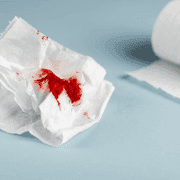5 Tips For Preventing Piles during Winter
In This Article
5 Tips For Preventing Piles during Winter
Elena
Updated on November 29, 2024
Medically verified by Dr. Arya
Fact checked by Dr. Fazeela

Proctology
5 min read
Winter brings cold weather and cozy days, but it can also lead to health concerns like piles, also known as hemorrhoids.
Piles are swollen veins in the rectal or anal area that can cause discomfort, pain, itching, and even bleeding during bowel movements.
While piles can occur at any time, the winter season can exacerbate the problem due to dietary and lifestyle changes, such as reduced water intake, comfort eating, and less physical activity.
However, with a proactive approach, you can prevent piles and enjoy a healthier winter.
In this blog, Mykare Health will guide you through five effective tips to prevent piles during winter, ensuring a season of comfort and well-being.
1. Stay Hydrated to Avoid Constipation
Winter often reduces the natural urge to drink water because cold weather suppresses thirst. However, dehydration can lead to hardened stools, which make bowel movements painful and increase the risk of piles.
Why hydration matters
When the body lacks water, the digestive system slows down, leading to constipation. Constipation causes straining during bowel movements, which directly impacts the rectal veins, resulting in piles.
How to stay hydrated during winter
-
Sip warm water: Cold water may feel unappealing in winter, so opt for warm water or lukewarm beverages.
-
Add hydrating foods: Include fruits like watermelon, oranges, and cucumbers in your meals.
-
Infused water: Add slices of lemon, mint, or ginger to your water for a flavorful hydration boost.
-
Soups and broths: Incorporate clear soups, broths, and stews into your diet for additional fluids.
Maintaining hydration not only prevents piles but also boosts skin health and immunity during the dry winter months.
2. Increase Fiber Intake for Healthy Digestion
Fiber plays a crucial role in preventing piles by improving stool consistency and promoting regular bowel movements. Unfortunately, winter diets often shift towards comfort foods like fried snacks, sweets, and refined carbohydrates, which lack fiber.
Why fiber is essential
Fiber softens stools and prevents straining, which is a major cause of piles. It also promotes healthy gut bacteria, aiding in smoother digestion.
Fiber-rich foods to include
-
Fruits: Apples, pears, bananas, and berries are great winter choices.
-
Vegetables: Incorporate spinach, carrots, sweet potatoes, broccoli, and cauliflower.
-
Whole grains: Oats, whole wheat bread, brown rice, and barley are excellent options.
-
Legumes: Lentils, black beans, chickpeas, and green peas are high in fiber.
Pro tip: Start your day with a high-fiber breakfast like oatmeal topped with fresh fruits and nuts. This will keep you energized and support your digestive health throughout the day.
Aim for at least 25–30 grams of fiber daily. To avoid bloating, increase your fiber intake gradually and pair it with plenty of water.
3. Maintain an Active Lifestyle
Cold weather can make it tempting to stay indoors, but a sedentary lifestyle is a major contributor to piles. Physical activity stimulates the digestive system, enhances blood flow, and reduces the chances of constipation.
How inactivity impacts piles
Sitting for extended periods puts pressure on the rectal veins, while lack of movement slows digestion. Both these factors can lead to or worsen piles.
Ways to stay active in winter
-
Indoor exercises: Practice yoga, aerobics, or stretching routines in the warmth of your home.
-
Daily walks: Bundle up and take a brisk 20–30-minute walk outdoors; fresh air and sunlight can uplift your mood as well.
-
Home chores: Turn routine activities like cleaning or organizing into a light workout.
-
Dance sessions: Play your favorite music and dance—it’s a fun way to stay warm and active. Staying active not only prevents piles but also helps manage winter weight gain and improves overall mood.
 5 min read
5 min readDon't Ignore Bummy Pain: Could It Be Piles?
 7 min read
7 min readBlood In The Stool: A Sign You Shouldn’t Ignore
 6 min read
6 min readSitting All Day Wreaking Havoc? It Might Be Piles!
Get a Callback Now
4. Avoid Long Sitting Hours
Prolonged sitting is common during winter, whether you’re working from home, binge-watching shows, or relaxing indoors. However, this habit puts unnecessary pressure on the veins in your rectal area, increasing the risk of piles
Tips to minimize sitting time
-
Frequent breaks: Stand, stretch, or walk for 5–10 minutes every hour. Use a timer or app to remind yourself.
-
Work smarter: If possible, use a standing desk for part of your workday.
-
Cushioned support: Sit on a soft cushion to reduce pressure on the rectal area.
-
Active relaxation: During leisure time, alternate between sitting and light movement, like pacing around the room.
If your job requires prolonged sitting, practicing these habits will reduce your chances of developing piles and promote better posture.
5. Practice Good Bathroom Habits
Unhealthy bathroom practices, such as delaying bowel movements or straining, can lead to piles or worsen existing symptoms. Winter often makes people hesitant to leave their warm spots, but holding in stools can cause them to harden, leading to constipation.
How to improve bathroom habits
-
Go promptly: Don’t delay using the bathroom when you feel the urge.
-
Avoid straining: Relax and take your time during bowel movements; don’t force it.
-
Keep it brief: Limit your time on the toilet to 5–10 minutes to avoid excess pressure on the veins.
-
Hygiene matters: Clean the anal area gently with warm water after bowel movements to prevent irritation.
Additionally, avoid distractions like mobile phones while in the bathroom, as these extend sitting time and put unnecessary pressure on the anal area.
Additional Tips for Winter Wellness
-
Warm baths: A warm sitz bath can soothe the anal area and improve blood circulation.
-
Herbal teas: Ginger and chamomile teas help in digestion and prevent bloating.
-
Dress warmly: Cold weather can slow circulation, so keep yourself warm with proper winter clothing.
Conclusion
Winter doesn’t have to be a season of discomfort. By staying hydrated, eating a fiber-rich diet, keeping active, avoiding prolonged sitting, and practicing good bathroom habits, you can significantly reduce your risk of developing piles.
Prevention is always better than cure, and these simple lifestyle adjustments will help you stay healthy and comfortable during the colder months.
Stay Hydrated: Drink warm water, herbal teas, and soups to prevent dehydration, which can lead to constipation.
Eat More Fiber: Include fruits, vegetables, whole grains, and legumes in your diet for regular bowel movements.
Keep Moving: Engage in daily physical activity like walking, yoga, or home chores to improve digestion.
Avoid Long Sitting Hours: Take breaks, use cushions for support, and alternate between sitting and standing.
Follow Healthy Bathroom Habits: Avoid straining, go promptly, and limit toilet time to maintain rectal health.
Warm Baths Help: Take a sitz bath to improve circulation and soothe the anal area.
Dress Warmly: Proper winter clothing keeps your blood flow steady and prevents piles-related discomfort.
Limit Processed Foods: Avoid fried and sugary snacks that can slow digestion.
Try Herbal Teas: Ginger and chamomile teas aid digestion and prevent bloating.
Seek Medical Advice: If symptoms like pain or bleeding occur, consult a doctor immediately to prevent complications.
Source Links
wikiHow Health



